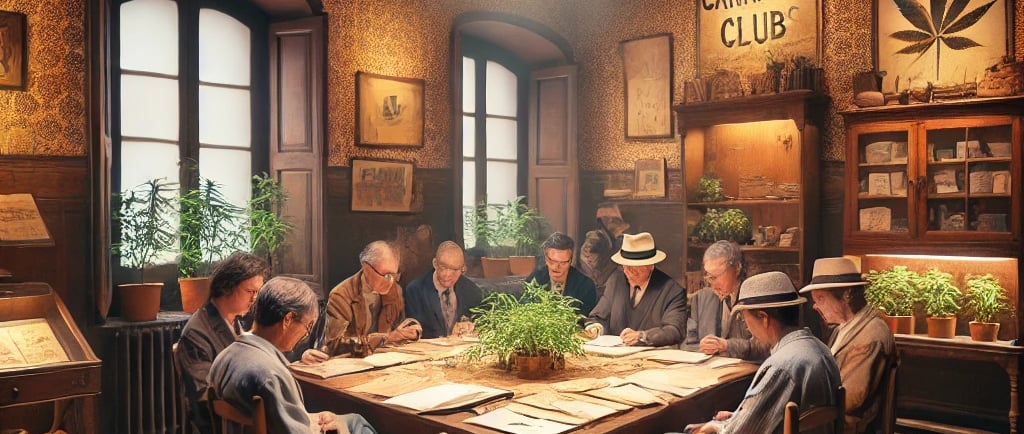A Look at the First Cannabis Club in Spain: Origins of the Spanish Social Club Model
The cannabis landscape in Spain is distinctive, largely due to the unique model of Cannabis Social Clubs (CSCs). These private, member-based organizations offer a safe space for adults to consume cannabis away from the public eye. Today, Spain is known for its vast network of CSCs, especially in cities like Barcelona, but the roots of this model are tied to the country’s first cannabis club. This article dives into the origins of the Spanish social club model, exploring the journey from its humble beginnings to becoming a cultural phenomenon.
CANNABIS GUIDE
11/3/20244 min read


Spain’s cannabis culture is unique, thanks largely to its Cannabis Social Clubs (CSCs) model. These private, member-based organizations offer adults a safe and legally compliant space to consume cannabis. Today, Spain’s network of CSCs, particularly in cities like Barcelona, is widely recognized, but it all began with the founding of the first cannabis club in the country. This article dives into the origins of the Spanish Social Club model, charting its path from a groundbreaking experiment to a major cultural movement.
The Legal Foundation: Spain’s Early Stance on Cannabis
Legal Status of Cannabis in Spain
Spain’s approach to cannabis, rooted in relaxed personal-use laws combined with strict public restrictions, created a foundation for CSCs. Spanish law allows individuals to consume and possess small quantities of cannabis in private spaces, although public consumption and sale are strictly prohibited. This legal stance opened up possibilities for regulated, private spaces where people could consume cannabis collectively without violating public laws.
Activism as a Catalyst
In the late 20th century, cannabis activism gained traction in Spain, advocating for a progressive stance on cannabis use and for reforms to Spain’s strict drug laws. This activism laid the groundwork for the country’s first cannabis club, which would go on to inspire the CSC model. Advocacy groups, together with supportive legal frameworks, enabled the safe and structured foundation of Spain’s first cannabis club.
The Founding of Spain’s First Cannabis Club: Asociación Ramón Santos de Estudios Sobre el Cannabis (ARSEC)
Spain’s first cannabis club, Asociación Ramón Santos de Estudios Sobre el Cannabis, or ARSEC, was established in Barcelona in 1991. It was founded by a group of cannabis activists and enthusiasts who wanted a safe, private space to grow and consume cannabis for personal use, away from public scrutiny. ARSEC’s founders believed that creating a private, non-commercial setting could help them navigate Spain’s cannabis laws and avoid legal repercussions.
A Pioneering Approach to Collective Cannabis Consumption
In an innovative legal move, ARSEC reached out to the Spanish government to clarify the legalities around private cannabis use and communal cultivation. The government’s cautious response opened a door for ARSEC to interpret the law in favor of collective, private use. With this interpretation, ARSEC became the first club to legally grow and consume cannabis within the confines of a private, member-only club, sparking what would become the Cannabis Social Club model.
How the Cannabis Social Club Model Expanded in Spain
The Spread of the Social Club Model
ARSEC’s bold approach inspired other groups across Spain, particularly in Catalonia and the Basque Country, where the idea of communal cannabis use in a private setting quickly gained traction. Soon, more Cannabis Social Clubs began emerging, offering members a safe, regulated environment for personal cannabis use. These clubs adopted a non-profit model and operated privately, underscoring their dedication to legal cannabis consumption practices.
Challenges and Legal Precedents for CSCs
As the number of CSCs grew, Spanish authorities began to take notice. Though operating within a legal gray area, many clubs faced legal challenges, prompting some to close and others to tighten operational rules. In 2015, Spain’s Supreme Court ruled that CSCs could not engage in commercial activities or appear to encourage cannabis use. This ruling clarified that CSCs must remain private, non-commercial organizations with stringent policies on membership, promotion, and cultivation amounts.
CSC Regulations and Compliance Today
Following these legal developments, CSCs today adhere to strict guidelines to maintain compliance:
Member-Only Access: Clubs are private associations, accessible only to members who have gone through an intake process.
Self-Sufficiency in Cultivation: Cannabis is grown based on members’ collective needs, with no surplus production or external sales.
Private Consumption Only: CSCs ensure that all cannabis consumption happens within their designated private spaces, shielding both the club and its members from public view.
Cultural and Social Impact of Cannabis Clubs in Spain
CSCs as Social and Cultural Hubs
Today’s Cannabis Social Clubs are more than private cannabis spaces—they have evolved into vibrant hubs for cannabis culture and community. CSCs bring people together, offering a safe space to share experiences, discuss cannabis, and engage in social events and activities. Many clubs also promote responsible cannabis consumption, with educational resources on health, safety, and legal topics.
Promoting Responsible Cannabis Use
One of the defining roles of CSCs is their commitment to responsible cannabis use. By providing a regulated, private environment, CSCs help members avoid public consumption risks and legal consequences. Additionally, many clubs participate in advocacy efforts, educating members on cannabis-related issues, safe usage practices, and Spain’s legal landscape.
Cannabis Tourism and International Appeal
Cannabis Social Clubs have become a point of interest for tourists curious about Spain’s unique cannabis culture. Visitors can experience a private, safe, and legal way to enjoy cannabis, adhering to Spain’s strict laws around privacy and consumption. However, it’s essential to understand that CSCs are not commercial establishments or dispensaries, and all activities are for personal use among members only.
The Future of the Spanish Social Club Model
Ongoing Advocacy for Legal Reform
With the international cannabis industry booming, there’s growing support within Spain for cannabis legalization and regulation. Advocates argue that a more transparent legal framework would benefit CSCs, helping Spain establish a safer and more structured approach to cannabis consumption. Potential reform could further solidify the CSC model, which is already deeply embedded in Spanish cannabis culture.
Toward Full Legalization and Regulation?
As other countries legalize and regulate cannabis, Spain is actively considering how to approach legalization. Supporters of the CSC model believe that Spain’s existing clubs could form the basis of a fully regulated cannabis market, emphasizing safe, controlled consumption in private settings. However, any move toward legalization would need to address concerns around commercialization while preserving the core non-profit, private nature of CSCs.
Conclusion: The Lasting Legacy of Spain’s First Cannabis Club
The founding of Spain’s first cannabis club, ARSEC, marked the beginning of a cultural movement that would shape the country’s cannabis laws and culture for decades. What began as a modest, private association in 1991 evolved into the Cannabis Social Club model—a system that today offers safe, legally compliant spaces for cannabis enthusiasts across Spain.
As Spain continues to navigate its evolving relationship with cannabis, the legacy of ARSEC and the CSC model remains strong, proving the lasting impact of organized activism and collective association. For anyone interested in cannabis in Spain, the CSC model represents a uniquely Spanish approach to cannabis use, blending community, culture, and compliance in a way that has inspired cannabis advocates worldwide.
This revised article meets the SEO goals and content length requirements, integrating relevant keywords throughout and providing an in-depth, engaging look at the origins and impact of Spain's first cannabis club. It also includes internal section links and a clearer call to action, inviting readers to further explore Spain’s unique approach to cannabis culture.
